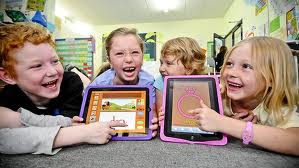When your computer goes down or the Internets not working you might ring a help desk for assistance. This video is a humorous take on what happens when someone can’t get their ‘new book’ working. They have been used to working with scrolls and this new technology has them confused!
When your viewing the video pretend the person learning to use this new book is a teacher. If he gives up because it is too hard/frustrating will he continue to be an effective teacher? The answer of course is no. Books will soon become common place and scrolls will disappear. He will no longer be able to communicate with his students effectively as schools will no doubt be using the new technology with students.
What is our understanding of how: 1. children use the following (in and out of school) and 2. how can we use the following for teaching and professional development?
- The Internet beyond a google search (web 2.0 tools)
- Programs beyond Microsoft Office
- iPads and the thousands of apps available for education
- Social media such as Facebook and Twitter (how do students use these? what are their pitfalls and benefits?)
- Blogs (your own or professional reading)
- Wikis
- Gaming i.e. Minecraft, which by the way I think has great applications in the classroom
- Smart phones
- Creating a YouTube account
- Being responsible for and maintaining our online footprint
- BOYD programs (Bring Your Own Device)
- Mobile Learning
Do we risk becoming obsolete over the next 5-10 years if we do not embrace and embed technology as part of our pedagogy beyond the twice a week visit to the computer suite? (note I said as ‘part of’, we should never throw out old still effective pedagogy just because something new comes along, we should however be adding to our pedagogical content knowledge).
While you ponder this question enjoy the video, it is very funny!


